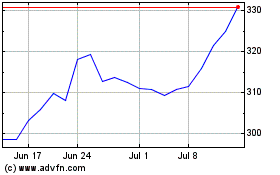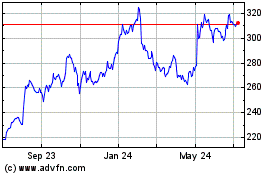Amgen's Repatha Study Shows Reduced Risk of Heart Attack, Stroke -- 3rd Update
March 17 2017 - 7:48PM
Dow Jones News
By Jonathan D. Rockoff and Betsy McKay
Amgen Inc. on Friday reported widely anticipated data on its new
cholesterol-lowering drug Repatha, showing it reduced the risk of
deaths, heart attacks and strokes. But the positive findings failed
to persuade Wall Street that health insurers would begin easing
access to the expensive drug.
A 6.4% drop in Amgen's share price on Friday underscored a
mounting challenge for drug companies once they have secured
regulatory approval for a new medicine: getting health plans to pay
for it.
Researchers found, in a study following 27,564 patients over 2.2
years, that Repatha reduced the risk of deaths, heart attacks and
strokes by 20% compared with standard treatment with statin drugs.
Repatha lowered the risk of a wider array of heart-related events
by 15%.
The risk reduction, although significant, may still not be
enough to overcome reservations about a drug that lists for more
than $14,500 a year, according to analysts.
"It is likely that the majority of restrictions" on coverage
such as requiring prior authorization, will remain, Barclays
analyst Geoff Meacham said in a research note.
To persuade health plans and drug-benefit managers to pay for
Repatha, Amgen has offered to refund the cost to payers for
patients who suffer a heart attack or stroke. About 4.9% of trial
subjects suffered one of the events, Peter Bach, director of
Memorial Sloan Kettering Cancer Center's Center for Health Policy
and Outcomes, said after reviewing the trial data.
"Now that Repatha has proven a meaningful reduction in
cardiovascular events, we expect payers to remove onerous barriers"
to patient access, Joshua Ofman, an Amgen senior vice president,
said Friday.
In 2016, Repatha sales totaled $141 million, including $101
million in the U.S.
Amgen has been striking so-called value-based reimbursement
deals with health plans like Cigna and Harvard Pilgrim Health Care
that tie the payments the company receives to the benefits to
patients.
Repatha, among the new injectable cholesterol-fighting agents
known as PCSK9s, was approved in 2015 after studies showed it cut
levels of bad cholesterol. Unclear was whether that LDL-cholesterol
reduction also reduced the risk of heart-related events, such as
heart attacks and strokes.
Without such evidence, health plans have limited access to
Repatha, as well as to rival drug Praluent from Sanofi SA and
Regeneron Pharmaceuticals Inc., in favor of much-cheaper statin
pills. Shares in Sanofi and Regeneron also fell Friday.
Amgen said last month that Repatha had met the goals of its
study, but released the specific findings only on Friday at a
medical meeting.
Amgen is "very confident" that doctors will view the results as
"practice-changing" and incorporate Repatha into their care of
patients whose cholesterol remains high despite treatment with a
statin or who can't tolerate a statin, said Sean Harper, Amgen's
chief of research and development.
Cardiologists who weren't involved with the study said the
health-plan paperwork required to get a prescription filled for a
PCSK9 drug like Repatha has proven too time consuming for many
practices, deterring prescriptions. The doctors also said that
determining which patients can benefit most from PCSK9 inhibitors
will still be critical, given their cost.
"We have to be very careful; this is very expensive stuff," said
Valentin Fuster, director of Mount Sinai Heart and
physician-in-chief at Mount Sinai Hospital in New York. "We have to
be sure we identify the right people for whom this type of approach
would be meaningful."
In making its case to the payers, Amgen may point to the study's
finding that the risk reduction improved after giving Repatha six
months. After a year's treatment, patients taking Repatha were at a
25% lower risk of heart-related events, Dr. Harper said.
Marc Sabatine, the Amgen-sponsored study's lead researcher, said
he expects that Repatha's benefits will increase over time, as they
did for statins. The risk of heart attack or stroke was reduced 19%
in the first year of the Repatha study and 33% beyond the first
year, suggesting a delayed effect of lowering LDL cholesterol, said
Dr. Sabatine, a cardiologist at Harvard-affiliated Brigham and
Women's Hospital in Boston.
Most statins were studied for five years, compared with 2.2
years thus far for Repatha, Dr. Sabatine said. The researchers are
now following more than 6,000 study patients in an extension of the
study to examine the drug's safety, and plan to monitor the
longer-term effects of the drug in more patients, he said.
Write to Jonathan D. Rockoff at Jonathan.Rockoff@wsj.com and
Betsy McKay at betsy.mckay@wsj.com
(END) Dow Jones Newswires
March 17, 2017 19:33 ET (23:33 GMT)
Copyright (c) 2017 Dow Jones & Company, Inc.
Amgen (NASDAQ:AMGN)
Historical Stock Chart
From Mar 2024 to Apr 2024

Amgen (NASDAQ:AMGN)
Historical Stock Chart
From Apr 2023 to Apr 2024
